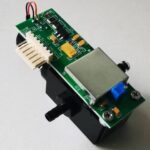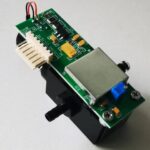
# Particle Counter: Essential Tool for Air Quality Monitoring
In today’s world, where air pollution is a growing concern, monitoring air quality has become more important than ever. One of the most crucial tools in this endeavor is the particle counter. This device plays a vital role in detecting and measuring particulate matter in the air, providing valuable data for environmental assessments and health safety.
## What is a Particle Counter?
A particle counter is an instrument designed to detect and count particles in the air. These particles can range from dust and pollen to more harmful substances like smoke and chemical pollutants. The device works by drawing in air samples and using various technologies, such as laser or light scattering, to measure the concentration and size distribution of particles.
## Importance in Air Quality Monitoring
The significance of particle counters in air quality monitoring cannot be overstated. They provide real-time data on particulate matter, which is essential for assessing the health risks associated with air pollution. High levels of particulate matter can lead to respiratory issues, cardiovascular diseases, and other health problems. By using particle counters, environmental scientists and public health officials can identify pollution sources, monitor air quality trends, and implement effective mitigation strategies.
## Applications of Particle Counters
Particle counters are used in a variety of settings, including:
– Environmental Monitoring: Tracking air quality in urban and industrial areas to ensure compliance with environmental regulations.
– Indoor Air Quality: Assessing the air quality in homes, offices, and schools to protect occupants from harmful pollutants.
– Industrial Hygiene: Monitoring workplace environments to safeguard workers from exposure to hazardous particles.
– Research and Development: Supporting scientific studies on air pollution and its effects on health and the environment.
## Choosing the Right Particle Counter
When selecting a particle counter, it’s important to consider factors such as the range of particle sizes it can detect, its sensitivity, and its ease of use. Different models are designed for specific applications, so choosing the right one for your needs is crucial. Additionally, regular calibration and maintenance are essential to ensure accurate and reliable measurements.
## Conclusion
In conclusion, particle counters are indispensable tools for air quality monitoring. They provide critical data that helps protect public health and the environment. As air pollution continues to be a global challenge, the role of particle counters in monitoring and mitigating its effects will only become more significant. Investing in high-quality particle counters and using them effectively is a step towards a cleaner, healthier future.
Keyword: particle counter


